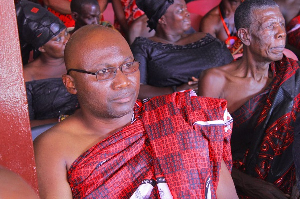- Home - News
- TWI News | TV
- Polls
- Year In Review
- News Archive
- Crime & Punishment
- Politics
- Regional
- Editorial
- Health
- Ghanaians Abroad
- Tabloid
- Africa
- Religion
- Election 2020
- Coronavirus
- News Videos | TV
- Photo Archives
- News Headlines
- Press Release
Business News of Monday, 18 February 2013
Source: Economic Tribune
Ghana to import timber to meet demand

Falling volumes of timber in Ghana, coupled with rise in illegal lumbering, has compelled the former net timber exporter to now import to augment demands of the industry.
The country's timber volume fell by 20.44 per cent and in value by 13.04 per cent in 2011.
Timber's foreign exchange earnings also fell slightly, as the country realised 7,187,938 Euros from export of 21,020 cubic metres of timber in 2011 compared to 8,265.642 Euros from 26,421 cubic metres in 2010.
Ghana has since concluded arrangements to import timber from Cameroon, Lands and Natural Resource Minister Mike Hammah, announced, saying the decision was to be a short to medium-term measure.
Addressing the Northern Sector Timber Association recently, Mr Hammah said that “due to the gradual depletion of the country's forest resources, the government is pursuing policy interventions to address challenges in the timber industry.”
A major intervention being carried out is the review of the country's forest and wildlife policy, which will shift focus from only timber production to non-consumptive values of the forest including protection of water bodies, conservation of biological diversity and eco-tourism development.
In addition, a draft Timber Procurement Policy had been developed to ensure that only legal timber are used in all public development projects, noting effective implementation of the policy will reduce the trade in illegal lumber on the domestic market.
The Forestry Commission in Ghana has also established a rapid response unit to deal with illegal chainsaw operations and other forest offences. Besides, the public legal department has been empowered to give special attention for the prosecution forest offences.
Ghana's timber trade goes to the key markets in the EU such as France, Germany, the UK, Belgium, Spain, Ireland and Holland. In 2008 for instance, total export volume and value accounted for 45.04 per cent and 33.25 per cent respectively to the EU.
The US market is also a major destination for Ghana's lumber (KD) and rotary veneer exports.
In the ECOWAS market the countries are mainly Senegal, Nigeria, Niger, Gambia, Mali, Benin, Burkina Faso and Togo. In 2008, these countries alone absorbed EUR30.35 million (96.54 per cent) of Africa's EUR31.44 million wood imports from Ghana.
The emerging markets in Asia and the Far East - India, Malaysia, Taiwan, China, Singapore and Thailand - altogether contributed EUR23.07 million (15.97 per cent) to Ghana's total of wood export value during January – September 2008.
Despite challenges, Ghana is still recognised as one of the most advanced tropical African countries in established forest policy, legislation, forest inventory, management planning, and in having a national forest standard and principles, criteria and indicators for judging the quality of forest management and usage.
The tropical forests of Ghana contain a wide range of timber species suitable for the construction industry, decking, flooring, panels and builder's woodwork.
The country brings to the market place legal timber species that have such attributes of intriguing grain structures, broad colour palette and natural durability fit for all architectural designs.
Statistics show that rapid population growth in the past four decades has resulted in the harvesting of almost all economic tropical trees like Odum, Sapele, Mahogany, and Wawa among others for the housing and construction industry, leaving lesser-known species to meet both the domestic and international markets.
An executive director of the Forestry Commission Alhassan Attah said the Voluntary Partnership Agreement (VPA) between the EU and some timber-producing companies in Ghana has ensured sanity in the timber trade by ensuring the export of only legally-produced timber products into the EU market.










